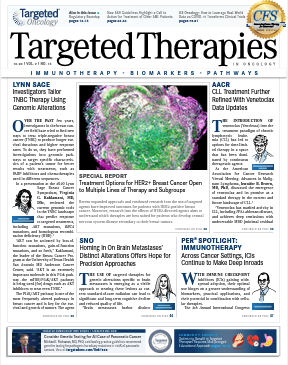How to Leverage Real-World Data as COVID-19 Transforms Clinical Trials
Due to efforts to reduce exposure to the coronavirus, oncology patient volumes initially decreased, treatment regimens were disrupted or altered, and new cancer diagnoses also slowed. This affected not only patient care, but also clinical trials.
Sarah A. Alwardt, PhD

In the last issue issue of Targeted Therapies in Oncology, Marcus Neubauer, MD, chief medical officer for The US Oncology Network, and I kicked off a 2-part series exploring the implications of the disruptions to oncology treatment patterns caused by coronavirus disease 2019 (COVID-19) and the potential impact on patient outcomes. Part 1 looked at how real-world data (RWD) gathered during COVID-19 on treatment patterns, complications, and the viability of treatment modification options can provide insights to inform future cancer care.
Part 2 builds on that foundation, reviewing how COVID-19 also has transformed the normal clinical trial process—trials have been discontinued or delayed, and data collection has been affected. This article will discuss the implications of this disruption and answer 2 critical questions, which are:
- how to leverage RWD for clinical trial rescue to maintain drug development during COVID-19, and
- how to understand the impact of COVID-19 on the data itself.
Clinical Trials Affected
Due to efforts to reduce exposure to the coronavirus, oncology patient volumes initially decreased, treatment regimens were disrupted or altered, and new cancer diagnoses also slowed. This affected not only patient care, but also clinical trials.
As a result, many trials were delayed or paused as biopharma sponsors tried balancing patient safety with minimizing risk to trial integrity. Recognizing that trial sponsors faced such challenges as quarantines, hospital and physician office closures, travel limitations, and supply chain interruptions, the United States Food and Drug Administration (FDA) issued guidance in March for conducting clinical trials during the COVID-19 pandemic that indicated protocol modifications or deviations might be unavoidable.
Using RWD to Rescue Trials Disrupted by COVID-19
Yet, even with these challenges, it is critical to maintain the drug development and regulatory process to make new drugs and new treatments available. We have an opportunity to think differently about the trials in flight and revamp the process of gaining insight into treatment patterns and performance during COVID-19 and beyond.
With a goal of protecting patient safety and helping sponsors complete trials and accelerate access to treatments, we must expand the use of RWD to complete trials disrupted due to COVID19. This includes expanding randomized controlled trial (RCT) eligibility and looking at new ways to leverage RWD to provide an alternative to having to accrue 2 arms when trial recruitment is challenging enough without a pandemic. Here are some methodologies to consider:
Synthetic control: Even prior to COVID-19, the FDA had begun to embrace the use of synthetic control cohorts to support drug development and regulatory approval of breakthrough medicines designed to improve patient care. With the willingness of the FDA to accept adjustments to trial protocols, synthetic control arms offer a tremendous opportunity to augment clinical data by allowing biopharma company sponsors to reduce the number of subjects assigned to the control arm in a randomized trial, or to conduct smaller randomized trials. This could be critical to completing or restarting trials disrupted by COVID-19.
Standard-of-care control arm: According to the National Cancer Institute, standard of care is defined as treatment that experts agree is appropriate, accepted, and widely used. There are a number of affected trials that were using— or planned to use—a prospectively accrued standard-of-care control arm. We have the opportunity to review the protocols for these trials and determine where strong evidence of standard of care exists that would support the use of historical data as the control arm. For example, RWD was pulled from McKesson’s iKnowMed oncology EHR data set to identify patients with metastatic Merkel cell carcinoma (mMCC). Those data were compared with a clinical trial arm for a new therapy to understand the patient response to treatment. This helped establish the FDA approval of a first-line therapy for mMCC, which was the first time RWD was part of a regulatory approval in oncology. This type of trial innovation reduces the number of patients who would need to be accrued during a pandemic, helps maintain patient safety, and avoids potential COVID-19 comorbidity challenges.
Real-world cohort as part of antiviral trials: In its formal guidance on development of COVID-19 treatments and preventative agents issued in May, the FDA indicated that expansive enrollment criteria will be necessary for clinical development to address the scope of the public health crisis and urged sponsors to enroll complicated or fragile patients. The use of pragmatic clinical trials, focusing on the correlation between treatments and outcomes in real-world clinical settings, has increased significantly over the last several years. Pragmatic trials offer the ability to test treatment options on more representative patient populations with fewer exclusions for common conditions that could affect outcomes in practice. These data can be used as a stand-alone analysis or as part of the RCT.
How to Ensure Data Quality During COVID-19
In addition to looking at methods to safely and efficiently conduct clinical trials in this new environment, it is also important to understand the impact of the coronavirus on the data itself, and to ensure that the data are complete, high quality, and generalizable across broad populations.
The potential for COVID-19 infections will reshape how we think about patient data for this time period, especially since testing has not been implemented consistently across the country. With a huge population that may have been affected, how do we think about recruitment, as well as including those we know were infected, when we’re analyzing health outcomes during this time frame? Do we simply censor the data and exclude any patients who were diagnosed or treated between January and May 2020, or can we find an appropriate way to address this potential confounding?
In order to track and record information related to the COVID-19 screening population, McKesson developed new data collection tools specific to the coronavirus for its iKnowMed oncology EHR. Beginning in mid-March, practices in The US Oncology Network started to screen patients at the door and gather clinical data about symptoms (fever, cough, fatigue) and risk factors, such as recent local or international travel. Practices also recorded if patients had been tested for COVID-19 and the test results.
To date, practices in The US Oncology Network have screened more than 100,000 patients. This is the beginning of a COVID-19 database that can be used to figure out whether patients’ treatment courses and outcomes were altered, as well as if patients had complications because they were COVID-19 positive, among other things.
With the ability to validate data lineage and verify patients’ status, these data will help identify qualified patients to enroll in trials more quickly.
Accelerating RWD in Oncology
The ongoing COVID-19 pandemic has magnified the value of RWD in oncology, and the industry has responded with a number of initiatives aimed at refining the role of RWD in guiding clinical trial development, answering important clinical questions, and supporting regulatory decisions. This includes the COVID-19 Evidence Accelerator, a collaborative effort to develop a common set of RWD elements and an initial set of priority questions regarding the therapeutic interventions, risk factors, and the management of COVID-19 in patients with cancer.
McKesson working with the Friends of Cancer Research, the FDA, biopharma companies, and other industry stakeholders on this new paradigm. This data aggregation effort is designed to not only look at how to best care for patients today, but to inform future cancer care and sup-port new models of clinical trials by leveraging RWD to its full potential.
Reference:
FDA Guidance on Conduct of Clinical Trials of Medical Products during COVID-19 Public Health Emergency. FDA. March 2020. Accessed August 18, 2020. https://bit.ly/3gH9Bab
Sarah A. Alwardt, PhD, is the Vice President of Data, Evidence, and Insights Operations for McKesson

Survivorship Care Promotes Evidence-Based Approaches for Quality of Life and Beyond
March 21st 2025Frank J. Penedo, PhD, explains the challenges of survivorship care for patients with cancer and how he implements programs to support patients’ emotional, physical, and practical needs.
Read More